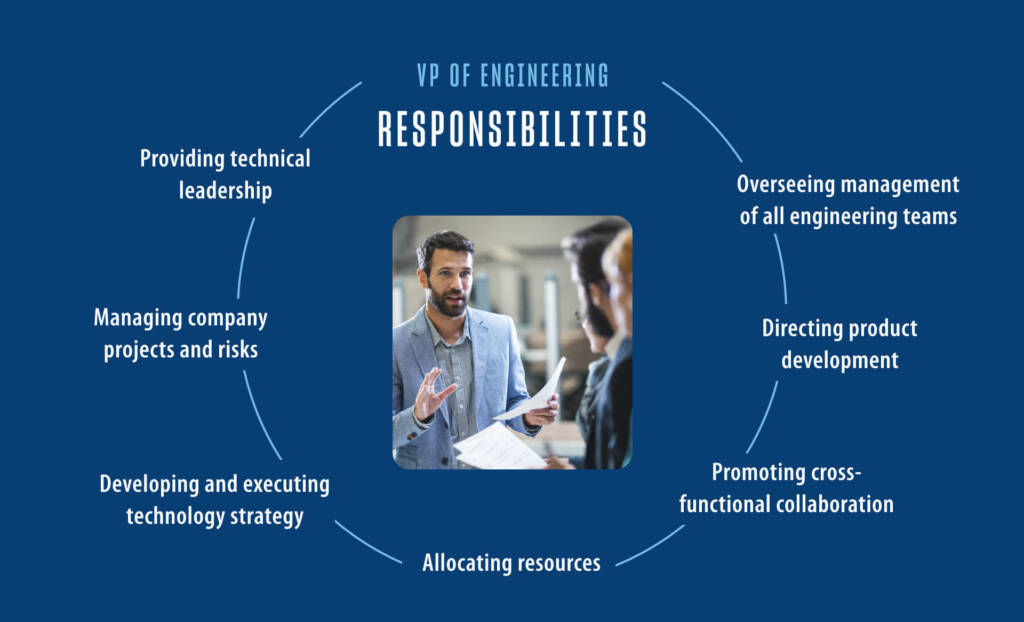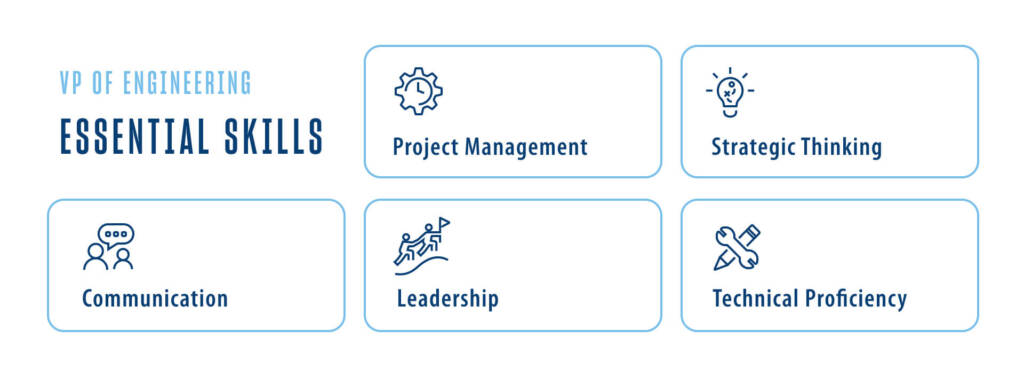Are you driven to be a leader in the engineering field and interested in advancing your career beyond engineering management? Then you should consider working toward the position of Vice President of Engineering.
This executive position oversees, mentors and manages other engineering professionals, including directors of engineering and engineering managers. As a high-level position with a lot of responsibility, it’s not a role for everyone, but it is highly rewarding — and very well compensated.
If this sounds like a position you’d like to pursue in your engineering career, here’s what you need to know about the role, responsibilities and requirements to become a VP of Engineering.
What Is a VP of Engineering?
The VP of engineering is the senior, often executive-level leader responsible for overseeing both the daily and long-term operations of an organization’s engineering department. A VP of Engineering is often considered the head of a company’s engineering function and will report directly to C-suite executives, either a Chief Technical Officer (CTO), Chief Product Officer (CPO) or the Chief Executive Officer (CEO).
Their primary responsibility is to carry out an efficient and informed product development process by overseeing all hiring, training, budgeting and strategic planning within the engineering department. Vice presidents of engineering can be found in many different industries that either manufacture products or are involved with different engineering projects; which can range from software development to the fields of aerospace, chemical, electrical or mechanical engineering.
What Does a VP of Engineering Do?


“The most important thing I learned in hindsight is that the right VP of Engineering for a company is contextual… Generally, the same basic things need to get done in most software companies, but the shape of the executive needed to guide those things can change dramatically depending on the current set of problems for the organization and who is already there, whether exec, manager, or IC. And once you’re in the job, the requirements also don’t stay static, especially in a growing company. The role may morph and shift over time just as other startup roles do.”
While every position will have its own unique requirements, in general, the VP of engineering’s responsibilities include:
- Providing technical leadership: The VP of engineering is who the engineering department looks to for the defined direction, best practices and strategies they need to follow. It is essential that the VP of engineering ensures the company’s strategies and practices align with the larger business goals — and makes adjustments when needed.
- Overseeing management of all engineering teams: VPs have oversight over all engineering teams as well as managers and directors. In addition to setting performance goals and conducting reviews of the product development process, they need to ensure the recruiting, hiring, training and termination of employees are in accordance with company policy.
- Directing product development: VPs of engineering play a key role in the development of the company’s products or services. They work closely with product management and design teams to ensure that production and development align with product roadmaps and customer requirements. They may also conduct market and product research to determine future initiatives.
- Allocating resources: The VP manages all resource allocation for the engineering department, including budgets, staffing and technical infrastructure. This involves making decisions and providing oversight for personnel assignments and the purchase and usage of equipment, software tools and other resources required to meet engineering objectives.
- Developing and executing technology strategy: The VP of engineering plays a central role in shaping a company’s technology strategy. They need to plan, implement and oversee engineering strategies, procedures and goals for an organization. This may involve evaluating new technologies, architecture and frameworks to ensure that the company remains competitive from a technical perspective.
- Managing company projects and risks: As VPs are responsible for ensuring that engineering projects are completed on time and within budget, they need to set priorities, track progress and address any roadblocks. This also involves assessing and mitigating technical risks, which can include cybersecurity threats, intellectual property protection and compliance with industry regulations.
- Promoting cross-functional collaboration: The VP is a major point of contact for other departments, including sales, marketing and operations, as they collaborate in promoting the success and growth of the company. They present research and strategy to other high-level managers and executive leadership and align engineering goals to the company’s larger needs.
What Types of Projects Do They Oversee?
While a VP of engineering’s goal is to drive innovation and ensure the success of engineering initiatives, their specific responsibilities will vary depending on the organization’s size and structure, as well as the field or industry it is in. One VP of engineering could run an entire technical division while another manages the development of a company’s suite of products.
In all cases, the VP of engineering oversees company and department strategy with a focus on future growth and development.
How Much Does a VP of Engineering Earn?
The exact salary you earn will vary based on your experience, skills, certifications, education and employer. As of October 2023:
- ZipRecruiter estimates the average annual pay for a Vice President of Engineering in the United States to be $212,240 a year.
- Salary.com puts the salary range between $250,243 and $322,503.
- Glassdoor has an average salary of $197,276 per year, but an estimated total pay of $303,432 including cash bonuses, commissions, profit sharing and stock options.
What Skills Are Needed to Reach this Level in Your Career?


As high-level managers, vice presidents of engineering need advanced leadership skills. Though they still need a foundation of strong technical skills, it is their ability to problem solve, communicate, strategize and adapt that determines their success and the success of their organization.
Essential skills include:
- Project Management: The ability to ensure the successful delivery of engineering projects on time and within budget
- Communication: The skills to convey complex technical concepts to non-technical stakeholders as well as to foster a collaborative and transparent culture within the engineering teams
- Leadership: The ability to set a clear vision and direction in addition to the skills to inspire and motivate engineering teams
- Strategic Thinking: The vision to anticipate and plan for future technological developments and an understanding of competition in order to establish an advantage
- Technical Proficiency: A strong technical background and deep understanding of the technologies relevant to the company’s industry to make informed decisions and provide guidance to others
“While you don’t need to be an expert in every area of engineering to be an engineering executive, a little empathy and high-level domain understanding across all your teams goes a long way.”
— Emily Nakashima
- Decision-Making: An analytical and strategic mindset capable of addressing technical challenges and making difficult decisions when necessary
- Adaptability: The flexibility to adapt to changing technologies and industry trends, the willingness to embrace new methodologies and approaches and the experience in knowing how to balance multiple responsibilities
- Business Acumen: An understanding of business strategy, effective vendor management, budgeting and market trends to align engineering efforts with overall business objectives
- Ethical Leadership: High standards and the ability to promote a culture of integrity, inclusivity and responsibility within engineering teams to meet ethical social and environmental standards
What Qualifications Are Needed to Become a VP of Engineering?
As one of the highest career positions an engineer can achieve, there are some significant requirements to become a VP of engineering — mainly a balance of advanced education and extensive industry experience.
Degrees
- A bachelor’s degree is generally preferable, especially in specific engineering fields such as computer science, electrical engineering or industrial engineering.
- It is also possible to come to this position from a non-STEM undergraduate program like business or project management, but you’ll need to develop your technical skills in other ways.
- Some organizations will prefer, or even require, an advanced degree such as a master’s of engineering, computer science or business administration (MBA).
- Some advanced degree programs, such as the Master of Science in Engineering Management and Leadership (MS-EML) provide specific instruction helpful in advancing to higher levels of technical management and leadership.
Certifications
- Though not necessarily required, certifications are useful for shoring up additional technical qualifications.
- Bootcamps in areas like coding, software development and UX design can help you focus on and update specific skill sets relevant to a VP position.
Experience
- The amount and type of experience will vary by positions, but expect most to require a minimum of 10 years of experience managing teams as an engineering manager, senior engineer or director of engineering.
- You’ll need to demonstrate expertise in relevant technical fields, such as software development, software engineering, DevOps or quality assurance in addition to experience with common platforms such as AWS and programming languages such as Java.
- At the same time, you’ll need to show that you’re experienced in different areas of business, which can range from conducting product and market research to budgeting for money and resources or recruiting and hiring personnel.
It’s important to understand that this position is rarely hired externally. With such a high level of required industry experience, domain knowledge and trust, most VPs of engineering are internally promoted from lower management positions.
What Positions come after VP of Engineering?
While you could consider VP of engineering as a capstone career position, there are other higher-level positions you could advance to.
- Executive VP of Engineering — This is a more advanced VP position that has executive decision-making powers and is considered second only to the president of the company. Other vice presidents may report to the executive vice president.
- Chief Product Officer (CPO) — The senior C-suite executive that is responsible for the entire strategy, development and management of an organization’s products or services. They oversee everything from product innovation and development through to marketing and post-release support.
- Chief Technical Officer (CTO) — The senior C-suite executive tasked with overseeing the technological aspects of a company to ensure that technology is aligned with business goals and objectives. Their main responsibility is to research, implement and support technologies that will grow the business externally to better serve clients and customers.
- Chief Executive Officer (CEO) — This is the highest-ranking C-suite executive in a company, responsible for making all major corporate decisions, managing overall operations and leading the organization toward its goals and objectives. While the CEO’s role can vary depending on the size and nature of the company, they hold the ultimate authority.
- Engineering Consultant — A VP of engineering that decides to go into business on their own or join a firm to become an engineering consultant. Though it is not a career move that comes via promotion, working as a consultant may afford you with greater freedom and flexibility in your career.